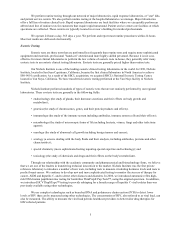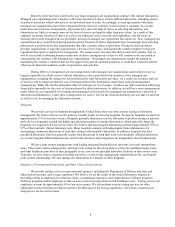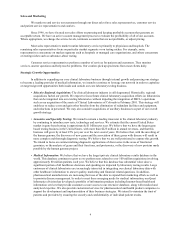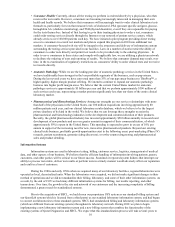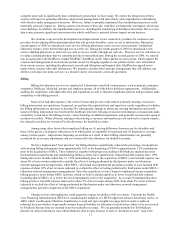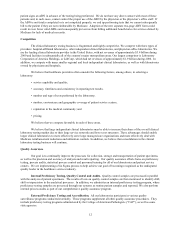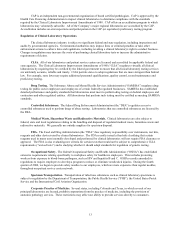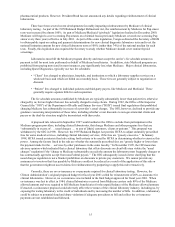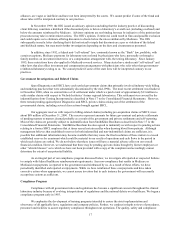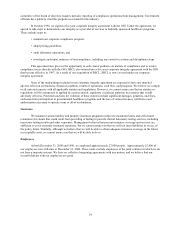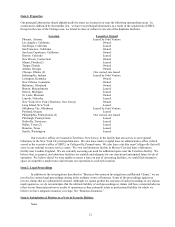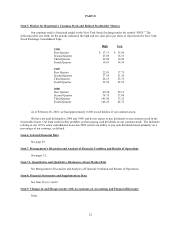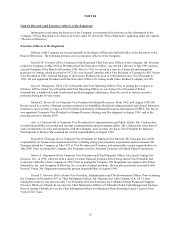Quest Diagnostics 2000 Annual Report Download - page 33
Download and view the complete annual report
Please find page 33 of the 2000 Quest Diagnostics annual report below. You can navigate through the pages in the report by either clicking on the pages listed below, or by using the keyword search tool below to find specific information within the annual report.13
CAP is an independent non-governmental organization of board certified pathologists. CAP is approved by the
Health Care Financing Administration to inspect clinical laboratories to determine compliance with the standards
required by the Clinical Laboratory Improvement Amendments of 1988. CAP offers an accreditation program to which
laboratories may voluntarily subscribe. All of the Company’s major regional laboratories are accredited by the CAP.
Accreditation includes on-site inspections and participation in the CAP (or equivalent) proficiency testing program.
Regulation of Clinical Laboratory Operations
The clinical laboratory industry is subject to significant federal and state regulation, including inspections and
audits by governmental agencies. Governmental authorities may impose fines or criminal penalties or take other
enforcement actions to enforce laws and regulations, including revoking a clinical laboratory's right to conduct business.
Changes in regulation may increase the costs of performing clinical laboratory tests or increase the administrative
requirements of claims.
CLIA. All of our laboratories and patient service centers are licensed and accredited by applicable federal and
state agencies. The Clinical Laboratory Improvement Amendments of 1988 (“CLIA”) regulates virtually all clinical
laboratories by requiring they be certified by the federal government to ensure that all clinical laboratory testing services
are uniformly accurate, reliable and timely. CLIA permits states to adopt regulations that are more stringent than federal
law. For example, state laws may require additional personnel qualifications, quality control, record maintenance and
proficiency testing.
Drug Testing. The Substance Abuse and Mental Health Services Administration (“SAMHSA”) regulates drug
testing for public sector employees and employees of certain federally regulated businesses. SAMHSA has established
detailed performance and quality standards that laboratories must meet to perform drug testing on federal employees and
contractors and other regulated entities. All laboratories that perform such testing must be certified as meeting SAMHSA
standards.
Controlled Substances. The federal Drug Enforcement Administration (the “DEA”) regulates access to
controlled substances used to perform drugs of abuse testing. Laboratories that use controlled substances are licensed by
the DEA.
Medical Waste, Hazardous Waste and Radioactive Materials. Clinical laboratories are also subject to
federal, state and local regulations relating to the handling and disposal of regulated medical waste, hazardous waste and
radioactive materials. We generally use outside suppliers for specimen disposal.
FDA. The Food and Drug Administration (the “FDA”) has regulatory responsibility over instruments, test kits,
reagents and other devices used by clinical laboratories. The FDA recently issued a final rule clarifying that certain
reagents used in many tests internally developed and performed by clinical laboratories will not require FDA clearance or
approval. The FDA is also evaluating new criteria for certain tests that would not be subject to comprehensive CLIA
requirements (“waived tests”) and is studying whether it should adopt standards for regulation of genetic testing.
Occupational Safety. The federal Occupational Safety and Health Administration (“OSHA”) has established
extensive requirements relating specifically to workplace safety for healthcare employers. This includes protecting
workers from exposure to blood-borne pathogens, such as HIV and hepatitis B and C. OSHA recently amended its
regulations to require employers to develop a program to reduce or eliminate needlestick injuries. During the fourth
quarter of 2000, we began to provide safety needles to our employees, which are more expensive than regular needles,
throughout our patient service center network.
Specimen Transportation. Transportation of infectious substances such as clinical laboratory specimens is
subject to regulation by the Department of Transportation, the Public Health Service (“PHS”), the United States Postal
Service and the International Civil Aviation Organization.
Corporate Practice of Medicine. Several states, including Colorado and Texas, in which several of our
principal laboratories are located, prohibit corporations from the practice of medicine, including the provision of
anatomic pathology services. These restrictions may affect our ability to provide services directly to consumers.




